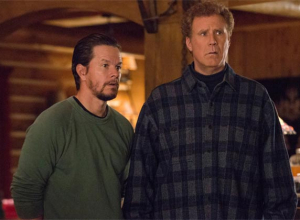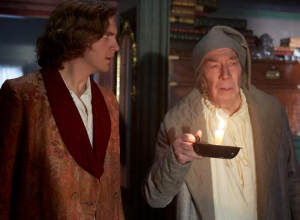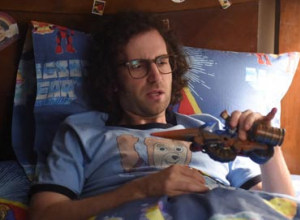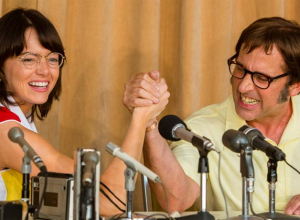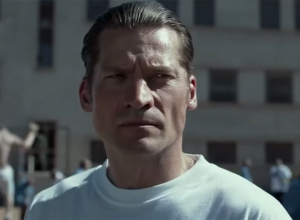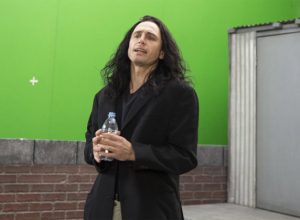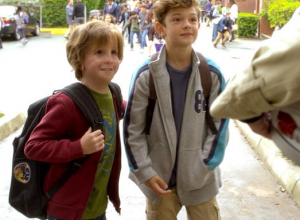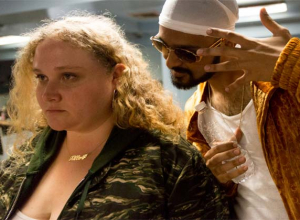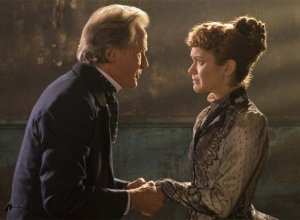Dancer In The Dark Review
By Rob Blackwelder
For years filmmakers have been trying to reinvent the musical. "Evita" went big, "My Best Friend's Wedding" sneaked musical numbers into its semi-standard romantic comedy, the "South Park" movie mocked the cartoon musical while besting it with genuinely catchy tunes, "Love's Labour's Lost" was an homage to the Fred and Ginger sing-songs of the 1930s.
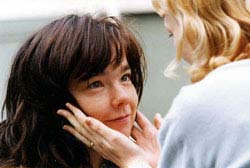
But no one has succeeded in making a truly modern movie musical, one that employs emerging filmmaking techniques instead of reaching back 50 years for inspiration. In fact, no one has ever even attempted something like "Dancer In the Dark."
Writer and director Lars von Trier -- the reclusive Dane behind the minimalist Dogme95 movement that espouses natural lighting, no props and handheld cameras -- discovers a way to marry his trademark sparseness with the unfettered showmanship of song and dance numbers in this daring retooling of the musical genre.
A tragic fable of innocence and injustice, the film stars elfin Icelandic alt-pop diva Björk as Selma, an immigrant factory worker in the American Northwest, circa 1964, who tries to hide the fact that she is rapidly going blind from friends and employers.
Working extra shifts and taking home products to package for additional pay, Selma squirrels away cash in fistfuls of small denominations, secretly saving for an operation that can save her 12-year-old son from an inherited disease that will eventually rob him of his eyesight as well.
A little naive, Selma is surrounded by protective friends. Kathy (Catherine Deneuve) is a motherly fellow immigrant from the factory floor. Jeff (Peter Stormare) is a timid romantic admirer and blue-collar grunt. Bill and Linda (David Morse and Cara Seymour) are a local policeman and his wife who rent Selma the trailer she lives in with her son.
More than a little absent-minded, at work Selma is easily distracted by the ambient rhythm of the metal presses, which become the beat for some of the sublimely spontaneous production numbers that emerge from her daydreams, fueled by years of attending Saturday musical matinees.
These sequences are an inventive, hypnotic cross between "Stomp"-style choreography, Björk's distinctive musical signature and von Trier's equally distinctive digital video vérité filmmaking. The songs themselves are not particularly catchy, but they are imaginatively staged and (unlike many musicals) occur naturally in the context of the story -- as when Selma walks home along a train trestle and the clickety-clack of the passing train cars start her singing along. (Some of Björk's costars sing too, with considerably less melodious results.)
Awarded best actress at Cannes (where the film also took the top prize, the Palm D'Or), Björk gives a startling, vulnerable, determined performance as Selma. Like Emily Watson in von Trier's masterpiece "Breaking the Waves," she plays this ill-fated heroine with a childlike disposition that invokes a custodial vibe in the audience, which kicks into high gear when her life takes a terrible turn.
During a heart-to-heart with friend and neighbor Bill, he confesses to being bankrupt and deadly afraid that his wife will abandon him when she finds out. Selma tells Bill of her son's illness and the hard-earned savings meant to cure him.
In his desperation, Bill betrays her trust. Taking advantage of her encroaching blindness, he hides in her trailer to discover where she keeps her money, setting off a chain-reaction of events with results so calamitous that Selma is jailed, charged with a brutal murder. This turn of events causes her to retreat further into a fantasy world where all of life is a musical in which another melody could be just around any corner.
Selma subsequently goes on trial, and "Dancer in the Dark" unravels somewhat under von Trier's gross misunderstanding of the American judicial system. The crime investigation is skipped over (but was clearly inept), and the courtroom scenes are badly abbreviated and so far-fetched they border on the absurd. (For starters, her lawyer doesn't have a single line of dialogue.) If von Trier did any research before writing this chapter of the film, he clearly abandon it when accuracy became a burden on his rushed narrative.
But while it's a little hard to brush aside such an obtrusive transgression, "Dancer in the Dark" is otherwise nothing less than a groundbreaking -- and magical -- art house reinvention of a genre that even Disney cartoons have been shying away from in recent years. The musical is not dead, it's just migrated into the arena of experimental film.
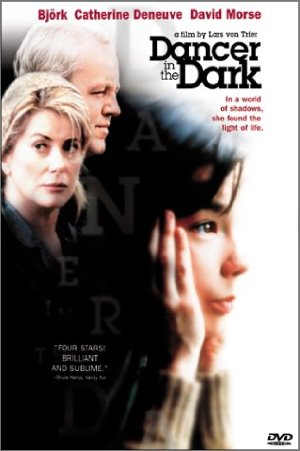
Facts and Figures
Year: 2000
Run time: 140 mins
In Theaters: Friday 6th October 2000
Box Office USA: $2.8M
Distributed by: Fine Line Features
Production compaines: Fine Line Features, Zentropa Entertainments, Film i Väst, Blind Spot Pictures Oy, France 3 Cinéma, Danmarks Radio (DR), Arte France Cinéma, Angel films, Canal+, Constantin Film Produktion, TV 1000, Vrijzinnig Protestantse Radio Omroep (VPRO), Westdeutscher Rundfunk (WDR), Yleisradio (YLE), Memfis Film, Sveriges Television (SVT), Film4
Reviews
Contactmusic.com: 3.5 / 5
Rotten Tomatoes: 68%
Fresh: 78 Rotten: 37
IMDB: 8.0 / 10
Cast & Crew
Director: Lars von Trier
Starring: Björk as Selma Jezkova, Catherine Deneuve as Kathy, David Morse as Bill Houston, Peter Stormare as Jeff, Joel Grey as Oldrich Novy, Cara Seymour as Linda Houston, Vladica Kostic as Gene Jezkova, Jean-Marc Barr as Norman, Vincent Paterson as Samuel, Siobhan Fallon as Brenda, Željko Ivanek as District Attorney, Udo Kier as Dr. Porkorny, Jens Albinus as Morty, Reathel Bean as Judge, Mette Berggreen as Receptionist, Lars Michael Dinesen as Defense Attorney, Katrine Falkenberg as Suzan, Michael Flessas as Angry Man, John Randolph Jones as Detective, Stellan Skarsgård as Doctor, Paprika Steen as Woman on Night Shift
Also starring: Bjork, Zeljko Ivanek

